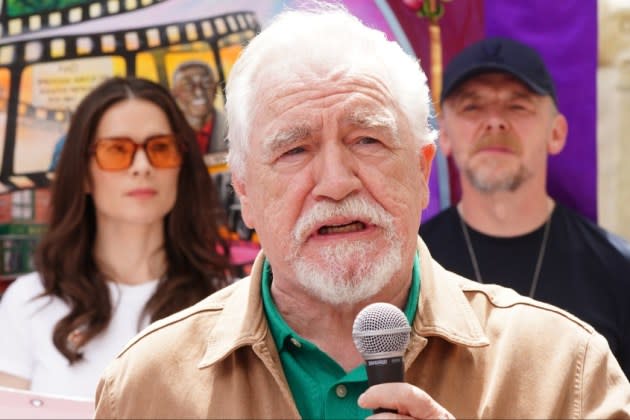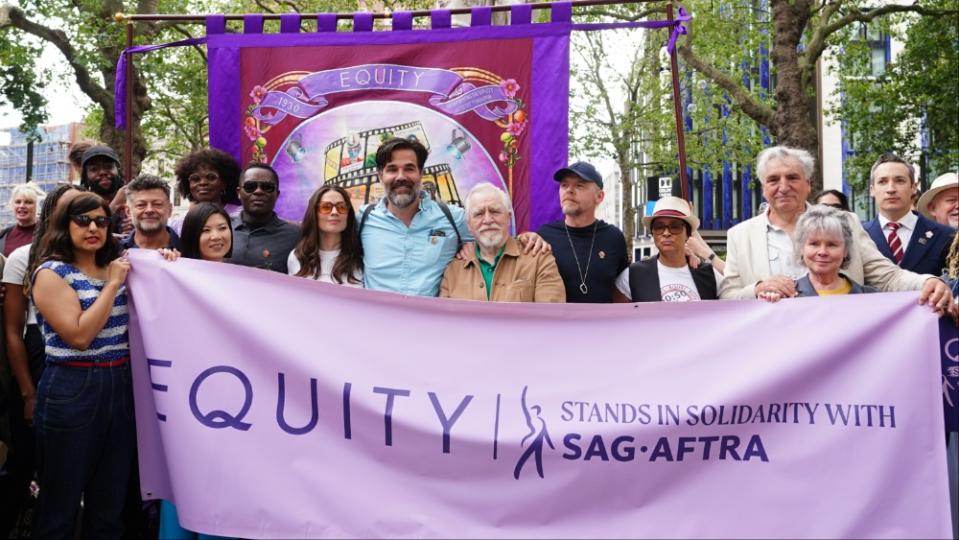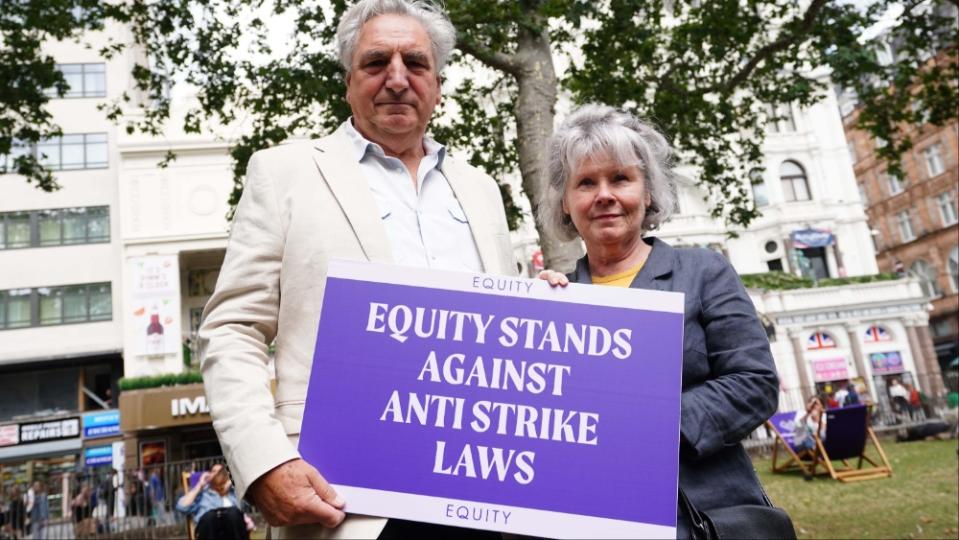Brian Cox Says ‘We Have to Stop’ AI at Equity Rally in Support of SAG-AFTRA: ‘No One Is Exempt From This’
- Oops!Something went wrong.Please try again later.
- Oops!Something went wrong.Please try again later.
- Oops!Something went wrong.Please try again later.

“One struggle, one fight, we support SAG-AFTRA strike!”
British acting talent delivered their fired-up message loud and clear in London’s Leicester Square on Friday at a rally organized by U.K. actors union Equity.
More from Variety
How SAG-AFTRA Talks Collapsed: 'I Was Taken Completely By Surprise,' Union Chief Says
Ted Sarandos Says SAG-AFTRA Asked for 'Levy' on Every Netflix Subscriber
SAG-AFTRA Alleges 'Bully Tactics' as Studios Suspend Negotiations
The notion that “their issues are our issues” resounded heavily among the crowd, with Equity president Lynda Rooke stating plainly: “There is no line drawn down the middle of the Atlantic Ocean that says that the problem stops there, because it doesn’t. This is a shared fight against the misuse of technology and automation by all the unions and the working class.”
In a 45-minute demonstration beneath the square’s looming William Shakespeare statue — the same site of a Writers’ Guild of Great Britain rally for the WGA strike just a month prior — the actors vowed solidarity with their American counterparts and writers, even though they’re not legally allowed to go on strike in the U.K. Many are affected by the same primary concerns that have been in the crosshairs of negotiations with Hollywood’s collective bargaining unit, the Alliance of Motion Picture and Television Producers (AMPTP): streaming residuals and artificial intelligence, as well as self-taping.
“Catastrophe’s” Rob Delaney served as MC for the rally, introducing his fellow stars and union personnel. Among the speakers was “Succession” star Brian Cox, “Alex Rider” star Rakie Ayola, Equity general secretaries Paul W. Fleming and Bectu boss Philippa Childs. Other actors who joined the group of speakers but didn’t deliver speeches included “Mission: Impossible 7” actors Simon Pegg and Hayley Atwell, “No Time to Die” star Naomie Harris, David Oyelowo, Andy Serkis, “The Crown’s” Imelda Staunton and “Downton Abbey” actors Jim Carter and Penelope Wilton.
During his speech, Cox focused on the impact AI could have on the acting business, sharing an anecdote from a friend who is in negotiations on a new TV show.
“He was told in no un-firm terms that they would keep his image and do what the fuck they like with it,” Cox said. “Now that is a completely unacceptable position, and that is the position that we should be fighting against, because that is the worst aspect. The wages are one thing, but the worst aspect is the whole idea of AI and what AI can do to us.”
Cox added in an impassioned tone: “This is going to happen to everybody. No one is exempt from this. If you’re on a film, on a movie, on a TV show: that’s where they’ll get you. And that’s what we have to stop!”
#Succession star Brian Cox speaks at Equity's rally in support of SAG-AFTRA: "The wages are one thing, but the worst aspect is the whole idea of AI and what AI can do to us." https://t.co/I0xc68oxjf pic.twitter.com/S3gaMkEbLy
— Variety (@Variety) July 21, 2023
Meanwhile, the U.K.-based Delaney — who told Variety that he’s gotten to know Equity bosses through his work with local nurses and rail workers unions — compared the AMPTP to toddlers. “You gotta show ’em, you gotta say ‘no’!” joked Delaney.
But the “Black Mirror” star was confident that the actors will win in negotiations, saying: “It won’t be easy. We gotta strike, we gotta withhold our labor. I’d rather be on the set of the film that I was on that got shut down to do this, and it’s so funny that they can’t have sympathy strikes because I’m on a SAG film shooting at Pinewood, shut down, can’t go to work, but I get to come here and meet you nice folks. We’re gonna get our win; we’re gonna get our tiny, little slice of the pie — the pie that we made up the recipe for and wrote the cookbook for.”
Delaney later told Variety that because “production is so global now,” strike action in the U.S. should have reverberations in the U.K. over time.
“I work on SAG contracts and Equity contracts depending on the job,” he said. “I’m a member of both unions, so there’s bad things about globalization but there’s also good things which is that it’s easier and faster to adopt successful tactics from other countries’ labor disputes. I pray and hope and will work for Equity benefiting from what SAG gets.”
The London rally brought out a range of acting talent from Britain. Also spotted in the crowd was “The Crown” star Tobias Menzies, along with “Vigil” actor Adam James and “About Time’s” Lindsay Duncan. Others included “The Swarm’s” Lydia Wilson and “The Witcher” stars MyAnna Buring and Eamon Farren.
Equity organized twin rallies on Friday in London as well as Manchester’s Media City.
Last week, the union was quick to emerge with guidance for its members. However, the org made it abundantly clear that although it stands in solidarity, it’s not legally allowed to follow suit with strike action. (The same, in fact, goes for the WGGB.)
The org explained that due to existing anti-trade union laws in the U.K., “SAG-AFTRA members currently working under an Equity U.K. collective bargaining agreement should continue to report to work.”
Effectively, what’s mattered more with the actors strike is whether a contract is under Equity or SAG-AFTRA rather than an actor’s union membership(s). Due to such legalities, work has managed to continue in the U.K. on shows such as “House of the Dragon.” Elsewhere in Europe, Sky and Peacock’s “Day of the Jackal” has also managed to keep filming.
In Leicester Square, Variety spoke to actors including Simon Pegg, Hayley Atwell, David Oyelowo and Brian Cox. Read on for their comments about the actors strike:
Hayley Atwell
Atwell confirmed she was filming “Mission: Impossible 8” but that production has been stopped due to the strike — “As it should,” she added.
“As an Equity member we are lawfully not allowed to strike but we do what we can to be in solidarity with those who can strike and also making sure Equity isn’t going to be used as a backdoor for anyone coming in, trying to be able to work by reworking the system,” said Atwell.
On AI, the London-born star said she’s “been scanned [for scenes using] ageing.”
“Instead of prosthetics it’s become a part of CGI and scanning, so I’ve been scanned and what was really alarming to me — and you can see it in deepfakes on social media — is the fact people can effectively steal your identity and make you sound like you and think like you and look like you but it’s not you and that’s a dangerous threat. Not just in terms of me and my job as an actor or for anyone who’s an actor [but] just what that means in stolen identity. It’s a terrifying concept. And I think we’re seeing it more and more. So many actors I’ve spoken to have said ‘Yeah we’ve been scanned for the one thing that we did but we don’t own the rights to that’ and that has to be regulated so when you’re signing up to do something like that you’re protected and you know what you’re signing up to and where you have control and where you don’t.”

Simon Pegg
“I believe wholeheartedly in what we’re standing for. It’s been a long time coming,” Pegg told Variety. “The streamers have been around a long time and there’s been no overhaul of the pay structures that compensate actors. It used to be that they would get residuals. It doesn’t apply anymore. 87% of actors can’t afford healthcare because they can’t pay their bills.”
“There’s been this unchecked corporate opportunism that has just spiralled out of control and I think that goes across every facet of the industry right now. The CEOs, the shareholders, they’re all just reaping the benefits of all these people that are getting no compensation for their work. It’s tempting to say, ‘Oh actors, why are they complaining’ but we’re the same as any other workforce.”
“We need to set a future where [young actors coming through] will be compensated fairly, where it’s an industry where they can enter and make a living. It’s going the same way as the music industry where artists are being paid for the records they’ve made. They have to go on tour. The next generation of young writers, actors, directors, every facet of creativity, we need to have an industry that gives them some incentive to enter into or where are we gonna be, there’ll be no entertainment.”
David Oyelowo
The “Silo” star is a dual SAG-AFTRA and Equity member and said “the word ‘equity’ is the reason we’re here.”
“We’re seeing a severe divide between the haves and the have-nots in this industry – that has to be corrected. There has to be acknowledgements of how the business has changed. And when it comes to artificial intelligence, no one is opposing technological developments, but they have to be regulated … They feel like completely reasonable demands. Why there’s a fight over this can only be attributed to corporate greed.”
Oyelowo acknowledged that he’s “one of the lucky ones in terms of being remunerated well for what I do” but said there are “a lot of working-class actors and writers and people in our industry who, when things are good, they’re holding on by a thread, let alone when they no longer have a lifeline that is residuals.”
On the U.K. laws preventing sympathy strikes: “That just feels completely wrong to me. To not be able to – in a democracy – be able to express democratically through your withholding of labor the grievances you’re facing, feels completely draconian and medieval to me. So that also has to change.”

Jim Carter and Imelda Staunton
“I’m here today as an Equity member of 50-odd years to stand behind SAG-AFTRA. I fully support it,” said Carter. “Most Equity members do, because their fight is our fight. What they’re doing is absolutely right and I applaud them.”
On what key issues in the U.S. strike have affected him personally: “It’s the issue of residuals. We’re not being paid properly for our work. Streaming services take our work and we have no control over where it’s shown or how many people see it. They’re not open about how many people see things so we don’t get properly recompensed for it. That’s ridiculous. Our performance isn’t just for the premiere and opening night; it’s for as long as it lasts, and we should be fairly recompensed for that.”
Staunton — who called U.K. strike laws “draconian” and “need changing” — added that the SAG-AFTRA strike “isn’t an American problem, or an English problem” but rather a “global problem.”
“[The] streaming services seem to be paying themselves and not the creatives,” she said. “The issue of AI is here. We need to talk about how it’s going to affect people’s financial circumstances. Most actors and most writers and performers seem to be at the bottom of the pile when the pay packet is issued, so I think that needs sorting out as soon as possible.”
Best of Variety
Sign up for Variety’s Newsletter. For the latest news, follow us on Facebook, Twitter, and Instagram.

